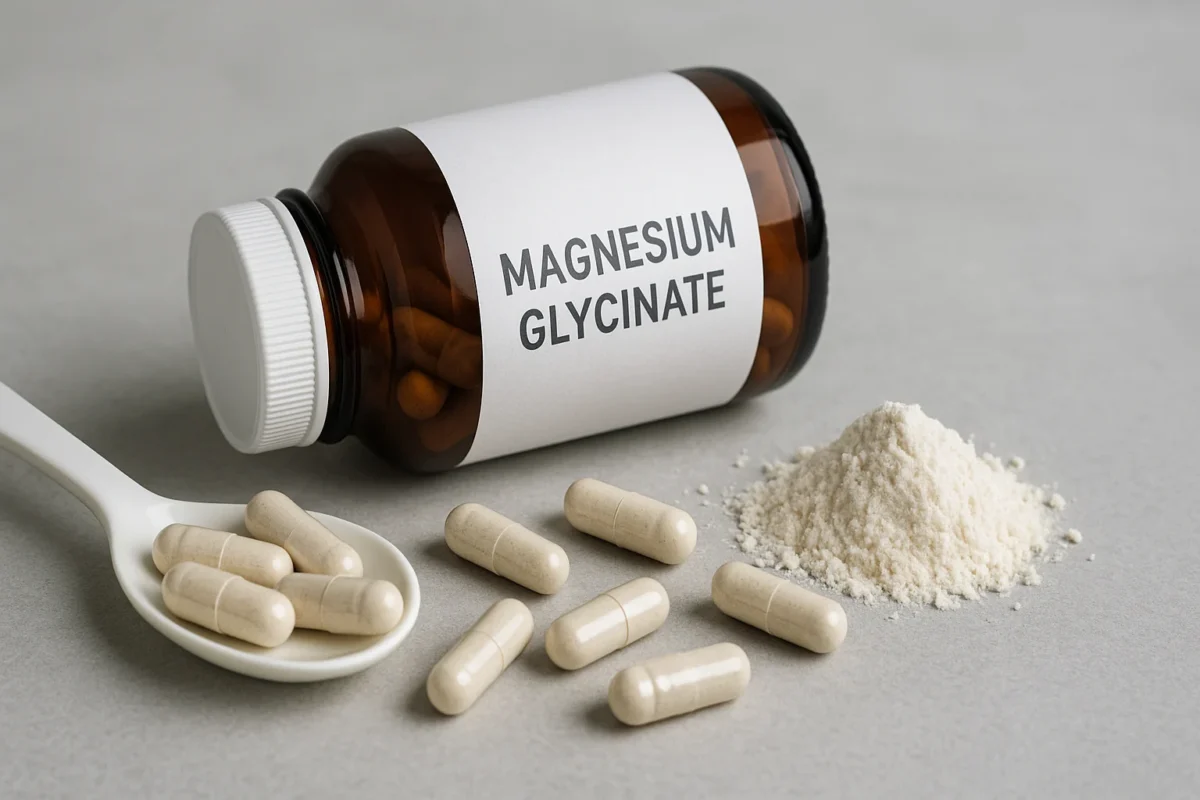Magnesium is one of the most important minerals for people. It takes part in more than 300 biochemical reactions that help our bodies work properly. Many people, however, don’t know that they are magnesium deficient, which can cause anxiety, trouble sleeping, muscle cramps, and fatigue. Magnesium glycinate is the most popular supplement for people who want to relieve stress safely and naturally. But what makes this type the best?
This complete guide goes over the science behind magnesium, the special benefits of magnesium glycinate, and how to use it as a long-term strategy to help with emotional strength, restful sleep, and overall health.
Understanding Magnesium’s Role in the Body

Magnesium is important for controlling the activity of the nervous system, muscles, blood sugar levels, and blood pressure. It also helps make DNA and RNA, proteins, and bones stronger.
Magnesium has a calming effect on the brain, which is more important for managing stress:
- Controlling neurotransmitters such as GABA and serotonin
- Preventing the overproduction of stimulating hormones such as cortisol
- Lowering inflammation in the body that is linked to mood disorders
Low levels of magnesium have been linked to more stress, anxiety, irritability, and even depression. Processed foods, caffeine, and stress can all quickly use up our magnesium stores in today’s busy world.
Why Taking Extra Magnesium Can Help with Stress
Magnesium is found in whole foods like leafy greens, nuts, legumes, and seeds, but even people who are health-conscious can not get enough because of poor absorption and soil depletion. That’s when supplements become necessary.
But not all magnesium supplements are the same. Some don’t get absorbed well, make your stomach hurt, or don’t cross the blood-brain barrier very well. This is where magnesium glycinate really shines.
What is Magnesium Glycinate?
Magnesium glycinate is a chemical that is made by mixing magnesium with glycine, an amino acid that calms the body and helps you sleep better. This special mix makes it easy for the body to use and easy on the stomach.
Magnesium glycinate is a better choice for stress, mood balance, and sleep support than other types like magnesium oxide or magnesium citrate, which can act as laxatives or be less easily absorbed.
Some supplements call it magnesium bisglycinate or buffered magnesium glycinate.
The Science Behind Magnesium Glycinate and Lowering Stress

Numerous clinical and peer-reviewed studies have validated the application of magnesium — particularly magnesium glycinate — for stress management:
1. Encourages calming neurotransmitters
Glycine, the amino acid that is attached to magnesium in this supplement, is directly responsible for making GABA, a neurotransmitter that is known for its calming and anti-anxiety effects. This has two benefits: magnesium calms down the nervous system, and glycine makes you feel more relaxed.
2. Helps the Hypothalamic-Pituitary-Adrenal (HPA) Axis
The HPA axis controls how the body reacts to stress. Long-term stress can make your adrenal glands tired and raise your cortisol levels all the time. Magnesium glycinate helps keep the HPA axis in check, which helps the body deal with daily stressors without overloading the nervous system.
3. Makes Sleep Better
Stress and not getting enough sleep can make each other worse. Magnesium glycinate helps you sleep better by calming your brain, relaxing your muscles, and making more melatonin. It does this naturally, so you won’t feel groggy in the morning like with sedatives.
4. Lessens the physical signs of stress
Stress that lasts a long time can cause muscle tension, headaches, stomach problems, and an irregular heartbeat. Magnesium helps relax muscles and support the nervous system, which can help with these common physical signs of stress.
Expert Recommendations for Magnesium Glycinate

Health professionals, nutritionists, and functional medicine practitioners often recommend magnesium glycinate as the best way to deal with stress-related symptoms.
- Dr. Carolyn Dean, who wrote The Magnesium Miracle, calls magnesium the “anti-stress mineral” and talks about how magnesium glycinate is better at being absorbed and calming without causing stomach problems.
- Dr. Mark Hyman, a well-known expert in functional medicine, often suggests magnesium glycinate for people who have anxiety, insomnia, or chronic fatigue because it is gentle but effective.
This form is also preferred by clinical dietitians because it helps both the nervous and muscular systems without interfering with other medications or causing diarrhea, which is a problem with other forms.
How to Use Magnesium Glycinate to Get Rid of Stress for Good
The Right Amount
Depending on your age, gender, and health, the recommended daily amount of magnesium is different:
- 310 to 320 mg per day for adult women
- Men over 18: 400–420 mg/day
Therapeutic doses of magnesium glycinate for stress relief usually range from 200 to 400 mg per day, and these doses are often split into two doses: one in the morning and one at night.
Always begin with a lower dose and change it based on how your body reacts. Talk to your doctor if you take medicine or have kidney problems.
When to Take It
- In the morning to help you stay energized and avoid stress during the day
- Evening: To help relax muscles and get a good night’s sleep
Some people take half of their dose in the morning and half at night so that they get the same benefits all day.
How long does it take to start working?
A lot of people say they feel calmer within a few days of starting magnesium glycinate. But using it regularly for several weeks gives the best long-term results because it helps the body store more magnesium and restore balance.
A Quick Comparison of Magnesium Glycinate and Other Forms
| Form | Absorption | Main Use | Side Effects That Happen Often |
|---|---|---|---|
| Magnesium Glycinate | A lot | Stress, anxiety, and sleep | Very little, easy on the stomach |
| Magnesium Oxide | Low | Constipation | Bloating and loose stools |
| Magnesium Citrate | Not too much | Regularity of the bowels | Diarrhea at larger doses |
| Magnesium Malate | High | Energy and muscle pain | May cause sensitive people to feel more awake |
| Magnesium Threonate | High (brain) | Cognitive function | Newer research that costs a lot |
Magnesium glycinate consistently ranks as the best choice for individuals prioritizing stress relief, sleep quality, and emotional balance.
Who Can Magnesium Glycinate Help the Most?
Almost everyone can benefit from having enough magnesium in their bodies, but some groups may find magnesium glycinate to be especially helpful:
- People who are under a lot of stress all the time: To calm the nervous system and lower cortisol
- People who have anxiety or panic attacks: For daily, natural help
- Women who have PMS or perimenopause symptoms: To help with mood swings and cramps
- Athletes or people who are active: To stop muscle cramps and help them heal
- People who have trouble sleeping or don’t sleep well: To get better deep sleep naturally
- Older adults: To help with thinking and stay calm without using sedatives
How to Tell If You Are Low on Magnesium

People often don’t realize they are low in magnesium, but it can be the cause of many health problems. Look for these signs:
- Always being tired or low on energy
- Having trouble falling asleep or staying asleep
- Muscle cramps or spasms that happen a lot
- Headaches or migraines
- Heartbeats that aren’t regular
- Changes in mood, anxiety, or anger
- Being sensitive to loud sounds or bright lights
- Problems with digestion
If you often have a lot of these symptoms, you should check your magnesium levels and think about taking magnesium glycinate.
Examples from Real Life and Reviews
Many people say that switching to magnesium glycinate has changed their lives for the better. Here are some examples:
- Sarah, 35, a busy working mom:
“After months of feeling on edge and snapping at everything, magnesium glycinate brought me back to calm. I didn’t know how tense I was until I felt better.” - James, 42, has chronic anxiety:
“I’ve tried everything, including meditation, therapy, and even medication. Adding magnesium glycinate helped me sleep better and deal with work stress without feeling too much.” - Emily, 29, who has hormonal problems:
“I started taking magnesium glycinate to help with PMS and bloating, but the biggest surprise was how much calmer and more emotionally balanced I felt all month.”
These stories show what the research shows: magnesium glycinate is a natural way to relieve stress that works over time.
How to Pick a Good Magnesium Glycinate Supplement
Not every supplement is the same. Here are some things to look for:
- Magnesium glycinate that has fully reacted: Don’t use blends or buffered versions that have fillers.
- No added chemicals: Pick labels that are clean and don’t have any extra ingredients.
- Third-party testing: Makes sure the product is pure and strong.
- Capsules are easy to use, but powders may let you change the dose.
Professionals often suggest brands like Pure Encapsulations, Doctor’s Best, and NOW Foods.
Pairing with a Certain Lifestyle for Better Results
Magnesium glycinate works well on its own, but it works even better when you live a healthy life:
- Mindful breathing: lowers short-term stress and helps the body absorb magnesium.
- A whole foods diet includes foods high in magnesium, such as almonds, spinach, and avocado.
- Regular movement: Exercise helps cells keep more magnesium.
- Stay hydrated: Not drinking enough water can affect how magnesium is used in the body.
- Digital detox: Less time in front of a screen helps you relax and sleep better.
The key is to be consistent. Magnesium glycinate should be used as a base, not a quick fix.
The Long-Term Benefits of Magnesium Glycinate
Magnesium glycinate builds long-term strength, unlike short-term fixes. You might notice the following with regular use:
- Less anxiety and mood swings
- Sleep that is more restful and doesn’t stop
- Better focus and understanding
- Less pain or tension in the muscles
- More control over your emotions when things get tough
- Not as much caffeine or sugar needed for energy
These cumulative benefits help keep you healthy and protect you from burnout, which makes magnesium glycinate a timeless friend in today’s stressful world.
Conclusion
We need to find ways to naturally and sustainably support our nervous systems in a world where stress is the norm. Magnesium glycinate is a unique solution because it is a supplement that is easy to take, absorbs well, and has been proven to work in real life.
Magnesium glycinate is the best form to help you deal with daily stress, get better sleep, or just feel more balanced and calm. It’s not a fad; it’s a permanent, basic solution that comes from the body’s biology.
Magnesium glycinate might be just what your body needs to deal with stress in a safe, effective, and long-lasting way.









